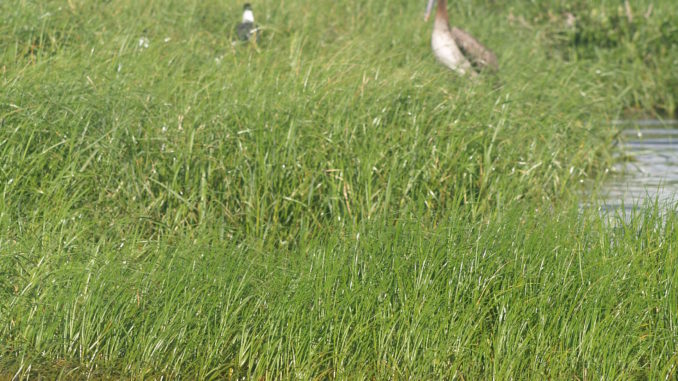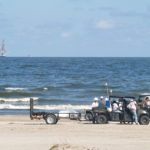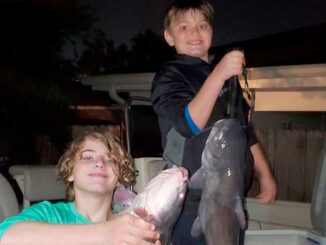
While many anglers have expressed frustration with a seemingly helter-skelter string of fishing closures and reopenings following the Deepwater Horizon oil spill, Louisiana Department of Wildlife and Fisheries head Robert Barham said there is method to the madness.
“When we have an imminent projection of oil into the area or a verified report that oil is in the area, we close it,” Barham told LouisianaSportsman yesterday (May 25).
For instance, Barataria Bay was shut down in two orders issued about four hours apart over the weekend. The LDWF chief said that was due to the actual presence of oil – a testament to the fact that National Oceanic and Atmospheric Administration forecasts aren’t always exact.
“We did not expect that oil to come inside Barataria Bay,” Barham said. “Oil came in, and we found it in multiple locations.”
The first confirmed report of oil led to the initial closure of the southeastern corner of the basin, but when oil was found in more northerly waters, Barham gave the order to shut the entire system down to a point just north of Bay Wilkinson.
Once an area is closed, sampling of seafood is stepped up to ensure there is no contamination, and monitoring of the oil begins to understand how the gooey mess will move around in the affected system.
Once managers are comfortable that waters are no longer affected by oil, a reopening is announced. But it’s not an overnight reversal.
“Generally for about seven days we monitor the presence or absence of oil,” Barham explained. “After that seven days, we send biologists out to find the presence of oil, and if they don’t find any, the area is reopened.”
However, he hurried to say that this seven-day period isn’t “carved in stone.”
Trout, redfish clean; Corexit main concern
Barham has been clear on the intent of these closures since enacting the first shut-downs east of the Mississippi River after oil began pouring into the Gulf of Mexico.
“I signed this emergency closure … as a proactive effort to prevent any oil-tainted fish, shrimp or crab from being caught and thus consumed,” Barham said at the time.
And there has been some contaminated commercial seafood found, although Barham admitted that none of the redfish or trout sampled came back positive for hydrocarbon contamination.
At the same time, experts have told LouisianaSportsman.com that there is no health threat from consumption of hydrocarbon-contaminated fish.
“It’s not a toxicity issue for people, per se. The seafood just doesn’t taste good,” retired LSU professor Ed Overton said. “It’s a consumption-quality issue.”
In other words, a contaminated fish would taste so bad that it would be inedible – so no harm would be done.
And Barham even admitted in yesterday’s interview that it was unlikely those gamefish Louisiana anglers love to chase would be polluted with hydrocarbons.
“Fish are going to avoid it if they can,” he said.
So why has recreational fishing been lumped in with commercial fishing operations, which could introduce large quantities of contaminated seafood into an unsuspecting public market?
After all, there are waters across the state still open to recreational fishing despite the confirmed presence of mercury in fish. In those instances, anglers are left to make an educated decision whether or not to fish those waters.
It all boils down to the scientific knowledge of mercury versus the oil dispersant Corexit, which is being used in large quantities by BP on the surface and at the source of the leak in defiance of orders from federal officials to at least reduce the amount used.
“There is a published tolerance for mercury consumption: There is no published tolerance for Corexit in mixture with hydrocarbons,” Barham said. “Until the EPA gives us the tolerance levels for consumption of Corexit, we cannot risk the public threat.”
Therefore, he said the only option is to shut down fishing wherever oil – and thus the threat of Corexit – is found.
“It’s not an option to put up a sign to fish at your own risk,” he said.
To report oil, call 866.448.5816.
Barham said he has requested information on Corexit studies from BP, and will talk with the head of Corexit manufacturer Nalco Company today (May 26).
In addition, he said LSU is set to begin work on a study – paid for by BP – to determine clearly what, if any, public health threat is posed from the dispersant.
Mum on length of closures, long-term impacts certain
Those words and some experts’ prediction that oil could be washing ashore 10 years from now even if the leak is plugged today sound less than promising about the future of fishing along much of Louisiana’s coast, but Barham refused to discuss the possibility that closures could plague the state for years to come.
“I’m not going to speculate on that,” he said. “There will be a day (when he will), but today’s not that day.”
However, Barham said he was realistic about the potential long-term impact of the spill.
“This is sort of an unprecedented event; my crystal ball is a bit hazy,” he said. “But I think you will have some areas, especially in the oyster-producing zones, that will be destroyed.”
He said he fully expects some oyster grounds will have to be abandoned because of contamination and reestablished in other areas.
Most frightening to Louisiana anglers is the threat of collapse of some fisheries, which Barham said is very real possibility.
“If the oil affects a species that other fish rely upon, it is possible you can have a collapse of that portion of the fishing industry,” Barham said.
He pointed to the Alaska experience following the 1989 Exxon Valdez spill as proof that large oil spills have lasting impacts.
“The herring industry collapsed,” Barham said.
That collapse was apparent soon after the spill, but Barham said there could be impacts that aren’t realized for years.
“Every year there are fewer salmon spawning in Prince William Sound,” he said. “It took years for them to pick up on that.”
So Barham has requested $30 million from BP to fund a study of long-term impacts from the spill on the state’s natural resources.
“This is going to be at least five years (before impacts are clear),” he said. “In five years following the oil-spill stoppage, I will have enough data to tell if the fishing is affected or not.”
As insurance against impacts that cost the state for decades, Barham is set to ask Congress next week to refuse any quick settlement that would release BP from long-term responsibility.
“This can’t be write a check a week after the oil spill is stopped and walk away,” he said. “I’m going to tell (congressmen), ‘Before you accept a settlement with BP, give us time to assess the true impact on the fisheries.’”



